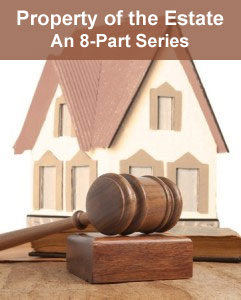#1 of 8 in Series
Property of the Estate in Bankruptcy: Difference between Chapter 7 and Chapter 13
 The goal of any chapter of bankruptcy is to try and settle debt with creditors. The difference between chapters 7 and 13 is how creditors go about looking for money. Ch13 is a wage-earner plan, in that you have a job and are making money or because you have assets you want to protect – that you don’t want liquidated, or because you want to deal with tax issues, or divorce issues, or to save a house, or to lower the payment on a car.
The goal of any chapter of bankruptcy is to try and settle debt with creditors. The difference between chapters 7 and 13 is how creditors go about looking for money. Ch13 is a wage-earner plan, in that you have a job and are making money or because you have assets you want to protect – that you don’t want liquidated, or because you want to deal with tax issues, or divorce issues, or to save a house, or to lower the payment on a car.Chapter 13 is for when you have a job or assets you want to protect.
Bankruptcy Code has Broad Definition of Property
Section 541* of the Bankruptcy Code is very broad in its definition of “property of the estate” and states:
(a) The commencement of a case under section 301, 302, or 303 of this title creates an estate. Such estate is comprised of all the following property, wherever located and by whomever held:
(1) Except as provided in subsections (b) and (c)(2) of this section, all legal or equitable interests of the debtor in property as of the commencement of the case.
(2) All interests of the debtor and the debtor’s spouse in community property as of the commencement of the case that is—
(A) under the sole, equal, or joint management and control of the debtor; or
(B) liable for an allowable claim against the debtor, or for both an allowable claim against the debtor and an allowable claim against the debtor’s spouse, to the extent that such interest is so liable.
(3) Any interest in property that the trustee recovers under section 329(b), 363(n), 542, 550, 554, or 723 of this title.
(4) Any interest in property preserved for the benefit of or ordered transferred to the estate under section 510(c) or 551 of this title.
(5) Any interest in property that would have been property of the estate if such interest had been an interest of the debtor on the date of the filing of the petition, and that the debtor acquires or becomes entitled to acquire within 180 days after such date—
(A) by bequest, devise, or inheritance;
(B) as a result of a property settlement agreement with the debtor’s spouse, or of an interlocutory or final divorce decree; or
(C) as a beneficiary of a life insurance policy or of a death benefit plan.
(6) Proceeds, product, offspring, rents, or profits of or from property of the estate, except such as are earnings from services performed by an individual debtor after the commencement of the case.
(7) Any interest in property that the estate acquires after the commencement of the case.
Basically, once you have file for bankruptcy, you don’t own anything; it all becomes property of the estate. The court, after looking at what you can keep, abandons certain property back to the debtor, and keeps the rest and sells it.
In a Chapter 7 bankruptcy, possessions are defined as property owned on the date the case is filed.
In a Chapter 13 case, the law states, “Not only does it include 541 properties, it also includes all property the debtor acquires after the case is filed, but before the case is closed, dismissed, or converted to another section.”
In a Chapter 7 bankruptcy, possessions are defined as property owned on the date the case is filed.
In a Chapter 13 case, the law states, “Not only does it include 541 properties, it also includes all property the debtor acquires after the case is filed, but before the case is closed, dismissed, or converted to another section.”
Property Includes All of Debtor’s Legal and Equitable Interests
The Seventh Circuit has defined the scope of Section 541 broadly stating, “When a bankruptcy petition is filed, virtually all property of the debtor at that time becomes property of the bankruptcy estate. Section 541 of the Bankruptcy Code defines ‘property of the estate’ broadly to include all of the debtor’s interests, legal and equitable. United States v. Whiting Pools, Inc., 462 U.S. 198**, 204-05 and nn. 8, 9, 103 S.Ct. 2309, 2313 and nn. 8, 9, 76 L.Ed.2d 515 (1983). ‘[T]he term `property’ has been construed most generously and an interest is not outside its reach because it is novel or contingent or because enjoyment must be postponed.’ Segal v. Rochelle,382 U.S. 375**, 379, 86 S.Ct. 511, 515, 15 L.Ed.2d 428 (1966) (bankruptcy estate includes right to refund). A debtor’s contingent interest in future income has consistently been found to be property of the bankruptcy estate. See In re Neuton, 922 F.2d 1379**, 1382-83 (9th Cir. 1990) (collecting cases). In fact, every conceivable interest of the debtor, future, nonpossessory, contingent, speculative, and derivative, is within the reach of § 541 (emphasis added).” In the Matter of Yonikus, 974 F.2d 901** (7th Cir.1992).
Everything you own or are entitled to receive is property of the estate.
However, the bankruptcy code does allow you to get some of that property back, they can’t liquidate everything. Property of the bankruptcy estate is what the court is generally going to keep to pay money back to creditors, what they are going to try and sell.
Here’s how to look at it: If the court was going to sell everything, your clothes, your bed, your pots and pans, etc., and leave you with nothing, you’d have to buy some things to replace that property, it would be on credit, and you’d be right back where you started.
However, the bankruptcy code does allow you to get some of that property back, they can’t liquidate everything. Property of the bankruptcy estate is what the court is generally going to keep to pay money back to creditors, what they are going to try and sell.
Here’s how to look at it: If the court was going to sell everything, your clothes, your bed, your pots and pans, etc., and leave you with nothing, you’d have to buy some things to replace that property, it would be on credit, and you’d be right back where you started.
Property Does Not Include Specific Funds and Financial Assets
Note that property of the estate does not include assets that are specifically listed in Sections 541(b)-(c). Among other items, such property does not include funds in an education Individual Retirement Account (IRC §530(b)(1)) if those funds were placed in the account more than a year prior to filing, and subject to certain limitations. 11 U.S.C. §541(b)(5). Such property also does not include funds contributed pursuant to IRC §529(b)(1) for college tuition expenses, again subject to certain limitations. 11 U.S.C. §541(b)(6). The estate also does not include amounts withheld by employers from wages of the debtor, or received by the employer from the debtor as contributions, to ERISA plans under IRC §414(d), deferred compensation plans under IRC §457, or tax-deferred annuities under IRC §403(b). It also does not include amounts contributed by the employee to health insurance plans regulated by state law. 11 U.S.C. §541(b)(7)(B). Spendthrift trusts enforceable under Indiana law would not constitute property of the estate. 11 U.S.C. §541(c)(2).
For your fresh start, the bankruptcy court allows individual consumers to keep certain items, including:
- Any Retirement account (IRA, 401K, PERF)
- Up to $17,600 of equity in your house (as a married couple, that would double to $35,000)
- $9,350 of personal tangible property
- $700 of intangibles ($350/person), which can include:
- cash
- stocks and bonds
- lawsuits settlements
- accounts receivable
- anticipated tax refund
- inheritance
- life insurance with a cash surrender value
- investments
Next Article in Series: Debtor in Bankruptcy Must Disclose All Assets and Liabilities or Risk Severe Penalties
* Source: Cornell University Law School Legal Information Institute
** Source: Justia
Disclosure required by 11 U.S.C. § 528(a)(3): We, the law office of Tom Scott & Associates, P.C., are a debt relief agency. We help people file for bankruptcy relief under the Bankruptcy Code.
